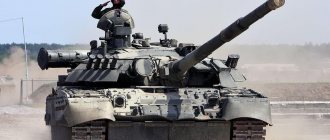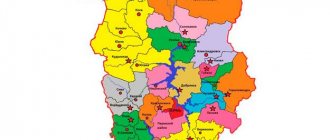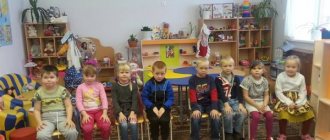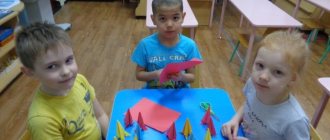ShkolaL wishes good day to the little schoolchildren and their parents!
Today our attention was paid to the project My Small Motherland. You need to pay special attention to it, since it is the very first school project in the life of a first-grader. It appears in the curriculum already in the third week of 1st grade.
The good news is that the topic is interesting and the task is quite simple. Let's see this by looking at the textbook on the world around us.
Project “My Small Motherland” | Sample | Photo
The project “My Small Homeland” 1st grade is the first of a series of upcoming ones. They all enjoy “special” love from their parents. Such tasks are aimed at developing joint activities of parents and children. Yeah!! In fact, this is mom’s personal headache. You wait with trepidation for the next project, but it still falls out of the blue. Before you have time to exhale after the cherished “project is completed,” the next one is already looming on the horizon.
The theme of the project is “My Small Motherland”, what should I write? Well, I think an essay is not required in 1st grade, just a few words about your city or the places depicted in the photographs are enough.
I recommend looking through all tasks of this kind and preparing the necessary photographs in advance. Wholesale. Then both the nerves and the child are intact? On kidside you will find similar tasks for the projects “My School”, “My Family”, and the mathematics project “Numbers in a Book”.
“My small homeland” 1st grade, the world around us, examples of work
Each photograph or series of photographs must be signed. It is important to express your attitude to places and events in the photo. The pictures are enlarged, click on the photo and you can read the text.
- We wrote about Belarus, even though our son was born in St. Petersburg, we decided to write about the small Belarusian town of Nesvizh and our village. Our roots come from there, we spend a lot of time in Belarus, and we love our small homeland very much.
- And our classmate (photo 2) took the topic “My small homeland - St. Petersburg” , talked about her area and memorable places where she visited.
- And another newly minted first-grader of 2015 wrote about St. Petersburg, about the museums and architectural monuments visited
We wish you excellent grades!
Liked this:
Like Loading...
kidside.ru
Project work plan
Of course, we will also complete the task from the textbook. That is, we will take photographs of Lipetsk with captions.
We also decided to supplement our work with data about the age of our city, its main features that distinguish it from other cities in Russia and which we can be proud of. Let’s also try to find our city on the map of our vast Motherland. It will be a real local history adventure.
Here is our work plan point by point:
- Find out how old Lipetsk is and when City Day is celebrated.
- Discuss what Lipetsk residents can be proud of.
- Find Lipetsk on the map of Russia.
- Find photos on the Internet with views of Lipetsk and choose the two most interesting.
- Come up with captions for the selected photos.
- Design your work as a tablet.
What is a tablet? It's like a laptop, but without the side flaps. A little further you will see everything for yourself.
You can begin collecting the necessary information.
Example of a speech at a presentation:
Hello! My name is Elena Nikitina and I am in first grade.
I live in the city of Moscow and this city is my small homeland.
My Moscow is a very beautiful city that I love very much. Moscow is an old city, but there are many new buildings in it. This contrast between the past and the future makes my city unique and unique, giving it its extraordinary beauty.
I love ancient buildings and modern new buildings in Moscow, I love its wide avenues and huge squares. I really love the Kremlin and Red Square, I love walking along Arbat and visiting museums. I love Moscow parks, especially Gorky Park. I also really love the numerous fountains that decorate my city.
My small Motherland is not just one, albeit a very large and beautiful city. For me, my small Motherland is, first of all, my yard, my kindergarten, and now also my school. These are my parents, my friends, my beloved cat. My little Motherland is everything that has surrounded me since birth, what I have become accustomed to and what I can never do without.
Conclusion:
This project helped me better understand what a small Motherland is and how much it means to every person.
Thank you for your attention!
Collecting information
So, our small homeland is the city of Lipetsk.
We found out that it was founded in 1703, which means that this year it turned 318 years old. Well, we already know about City Day. We attended the celebration in person in the month of July.
Then we brainstormed together to figure out what we, as Lipetsk residents, can be proud of.
The following options have been selected:
Lipetsk is called the pearl of the Black Earth Region.
Lipetsk is a very green city.
Lipetsk has a very beautiful and large railway station.
The city has the so-called Lipetsk Sea.
One of the largest metallurgical plants in Russia is located in our city.
Lipetsk is called the city of fountains.
There are many beautiful parks in Lipetsk.
There are so many reasons to be proud! Then from this variety we will choose the very best.
It's time to start mapping Russia. We conducted a geographical study of the map and Lipetsk was found)
The Internet is full of photographs with views of our city. We chose two.
This photo shows our city Komsomolsky pond with fountains.
And this is the most beautiful Lenin-Cathedral Square, which we often visit.
We thought that a couple of photos would be enough. In the second grade we’ll have a blast, there’s a project called “Hometown”, essentially the same topic. Then we will make a whole photo album.
In the meantime, let's start making our tablet.
MAGAZINE Preschooler.RF
Pedagogical project “My small homeland”Municipal budgetary preschool educational institution Combined type kindergarten No. 411 of the Samara city district
Completed by: Bogomolova Natalya Aleksandrovna Teacher, MBDOU kindergarten No. 411 Samara, 2022
For Russia our city is a particle, but for us it is our parental home. And we are glad that we can be proud of the Small Motherland where we live.
Civil patriotic education today is one of the most important links in the system of educational work. Of great importance for the cognitive, social, personal and moral development of preschool children is familiarity with their native country, hometown, the history of their native land, and its attractions.
Parents have insufficient knowledge about their region, do not pay attention to this problem, consider it unimportant, children do not have sufficient information about their hometown.
Project participants: children of senior preschool age, preschool teachers, parents.
Implementation period: September – May
Project type: long-term
Features of the project:
- by the nature of the product: educational and research, informational
- by number of children: group
- by nature of contact: open
- by knowledge profile: interdisciplinary
Implementation conditions: interest of children and parents
Relevance of the project.
Huge changes have occurred in our country in recent years. This concerns moral values, attitudes towards the events of our history. People's attitudes towards their Motherland have also changed: now they talk about it mostly negatively. However, the difficulties of the transition period are not the reason for the suspension of patriotic education.
No matter how society changes, instilling in the younger generation love for their country, their small homeland, and pride in it is necessary under any system.
“Small Motherland” is, first of all, the child’s family, home, kindergarten, the nature that surrounds him, memorable places of his hometown and village, famous people.
A preschooler must first of all recognize himself as a member of the family, an integral part of his small homeland, then as a citizen of Russia, and only then as an inhabitant of planet Earth.
Within the framework of the Federal State Educational Standard for Preschool Education, for children of senior preschool age, the direction of civic-patriotic education is included in the educational area “Cognitive Development” . The older preschooler should be focused on: patriotism, social solidarity.
Novelty of the project.
The project will help preschool teachers:
- in realizing the highest priority direction in the educational process of preschool educational institutions is the natural “entry” of children into the surrounding society, accessible to their age characteristics
- in determining the goals and objectives of the harmonious introduction of a child into the world around him, primarily through the prism of national culture, life and traditions of his people
- in understanding the importance of the preschool period of life, since the education of the best moral and spiritual qualities of a child’s personality (love for family, kindergarten, native land) begins from the time when he only learns to see, hear and understand the world around him.
Hypothesis.
It is necessary to cultivate in a child a love for his home, family, and kindergarten from the first years of life. The child must understand that having his own home is a great blessing. All good things begin with the home and mother - the keeper of the hearth.
Expected results:
- children can know and name their place of residence, some enterprises of their hometown and village, city symbols, attractions, flora and fauna
- children can give their home address, feel love and affection for their home, family, kindergarten, and go to kindergarten with pleasure
- children can know and name the place of work of their parents and grandparents, the significance of their work, feel pride and respect for the work of adults, show attention and respect to WWII veterans, the elderly, and provide all possible assistance to them.
The goal of the project: to expand children’s knowledge about their native land, to continue to introduce them to their hometown, its historical past and present, and to cultivate love for their small homeland.
Project objectives:
- introduce children to the historical past of Samara, their native village
- expand children's understanding of the diversity and uniqueness of the nature of the Samara region
- deepen knowledge about the features of the city’s architecture, Samara’s affiliation with the space industry, Samara’s capabilities as a large industrial city
- introduce them to the enterprises that exist in the village and where their parents work
- cultivate love for home, family, kindergarten, city
- promote the active involvement of parents in joint activities with the child in family and kindergarten settings.
Stages of work on the project
Stage 1 – preparatory
- diagnosing children, questioning parents
- creation of a subject-development environment
- selection of didactic and illustrative material, didactic games, methodological literature
- Stage 2 – main
Program sections
Types of children's and adult activities Play activity — Didactic games “Coat of arms of the city”, “Flag of Russia”, “Name the profession”, “Red, yellow, green”, “Tell where you live”, “Name the streets of our city”, “Collect a picture”, “Find out where I am", "Find out by description" — Role-playing games “Shop”, “Mail”. “Family”, “Polyclinic”, “Kindergarten”, “School”, “City Trip”
Cognitive activity — NOD “Our army is dear”, “It was made by us”, “Native village - past and present”, “Samara is our native city”, “Symbols of Samara”, “Heroes of space”, “The streets of our city bear their names”, "Famous writers of the Samara land" — Conversations “Who serves in the army”, “Types of armed forces”, “Children-heroes of the Second World War”, “The city I live in”, “Our names”
— Looking at photographs of the village and city over the years
— Excursions to the place of work of parents
— Virtual tour “Sights of Samara”
-Educational quiz “Who lives in our forests”
Speech development — Compilation of stories about the work of parents, on the topic “My hometown (village)”, “Corners of my hometown”, “Who do I live with” — Writing poems about mom, friend
Fiction -Reading and memorizing poems on the topic of the project — Guessing riddles
Fine and productive activities — Drawing and application of the flag, coat of arms of Samara — Acquaintance with the works of I. Repin
— Listening to the anthem of Samara, songs about Samara
-Construction of “My favorite kindergarten”
— Paper construction “This Victory Day”
— Application “Buses are driving through the streets”, “My home”
Drawing “My kindergarten”, “We are walking in the park”, “Sights of Samara”
— Drawing holiday cards for moms, dads, and kindergarten employees
Social and personal development — Campaign “Feed the birds in winter” — Communication games “I’m growing...”, “Call me kindly”
— Story “Samara Museum of Cosmonautics”
Physical development -Outdoor games “Train”, “Fast rockets are waiting for us” — Physical education “Dad, Mom, I am a sports family”, “Winter fun”
— Conversations “Rules of safe behavior”, “What am I made of”, “How our body works”
— Development of the “Cleanliness Rules”
— Didactic games “Dangerous-not dangerous”, “Healthy and unhealthy food”
Working with parents:
— Design of photo exhibitions “When Dad Was a Soldier”, “Mommy and Me”
— Compilation of the album “Serving Russia”
— Compiling a photo album “My Samara”
— Exhibitions “Space Rockets”, “My Favorite Kindergarten”, “My Samara”
— Consultations “Moral and patriotic education of preschool children”, “Everything starts from childhood”
— Parents’ meeting “The role of the family in instilling patriotic feelings in preschoolers”
— Questioning parents
Stage 3 – final
— Final diagnosis of children, repeated questioning of parents
— Exhibition of drawings and crafts dedicated to Victory Day
— Laying flowers at the village memorial
— Quiz game “Do you know your small homeland?”
The result of the project: during the implementation of the project, children acquired knowledge about the history of the city and the village, the symbols of Samara, its attractions, they know the names of those who founded and glorified the city and the village, they know their address, the place of work of their parents and grandparents, they reflect their impressions in productive activity. Thus, we can consider that the goal and objectives of the project have been achieved.
Bibliography
- Aleshina N.V. Introducing preschoolers to their hometown: Lesson notes. – M.: Sphere shopping center, 1999.- 112 p.
Barannikova O.N. Lessons on citizenship and patriotism in kindergarten: A practical guide. – M.:ARKTI, 2007. – 144 p.
- Zavalny A. N., Zinchenko V. N., Mokry V. S. Symbolism of the Samara region. – Samara: “Sam Ven”, 2001. – 44 p.
- Makhaneva M.D. Moral and patriotic education of preschool children. Toolkit. – M.: TC Sfera, 2009. – 96 p.
- Patriotic education of preschool children through local history and tourism activities / Ed. A. A. Ostapts, G. N. Abrosimova, M. E. Trubacheva. – M.: ARKTI, 2003. – 176 p.
List of sites.
- https://infourok.ru
- https://www maam.ru
- https://nsportal.ru
- https://otv.21bel.tvoysadik.ru
| < Previous | Next > |




